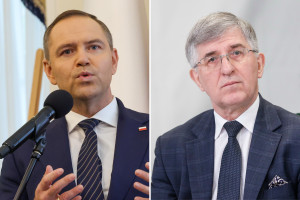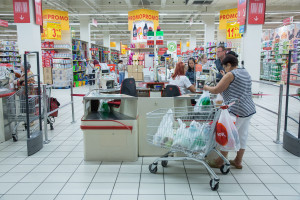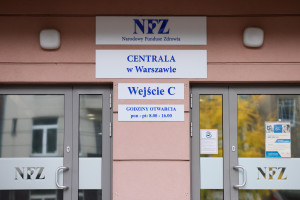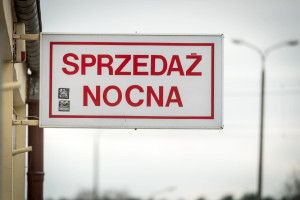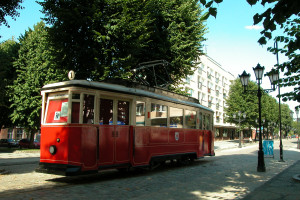The anti-alcohol bill is back for public consultation. Will there be changes to the penalty for withdrawing permits?

- The Ministry of Health announced that the so-called anti-alcohol law will be reopened for public consultations.
- This information was provided by Deputy Minister Wojciech Konieczny in response to an interpellation by MP Ireneusz Raś.
- The reason is the large number of comments
- There will be, among other things, changes aimed at tightening the procedure for withdrawing alcohol sales permits.
The Ministry of Health announced that it would once again submit the so-called anti-alcohol law for public consultation.
This information was included in the response given by Deputy Minister of Health Wojciech Konieczny to an interpellation by MP Ireneusz Raś.
"(...) due to the large number of comments submitted to the draft act amending the act on upbringing in sobriety and counteracting alcoholism and the act on health care declarations financed from public funds, including comments expanding the solutions proposed by the Ministry of Health, it is planned to submit the draft act for further public consultations in the near future," announced Deputy Minister Wojciech Konieczny.
The Ministry received numerous comments and proposed changes. It rejected those regarding the definition of alcohol license revocation. However, it supports, among other things, a one-year ban on reissuing licenses in the same location.
According to the Ministry of Health, the proposal to index fees for the sale of alcohol and to extend the definition of promotion is also "worth attention".
No to changing the definition of the grounds for withdrawing a permit to sell alcoholThe Ministry of Health, after consultations with the National Centre for Addiction Prevention , did not support the proposal to change the definition of the grounds for withdrawing permits to sell alcohol in the so-called Anti-Alcohol Act.
Currently, revocation is only possible if, within a six-month period, public order is disturbed at least twice due to the sale of alcohol and the owner of the point fails to notify the relevant authorities.
According to the ministry, this construction of the regulations protects entrepreneurs against arbitrary decisions of administrative bodies, but at the same time allows for the elimination of unreliable sellers.
Tightening the ban on re-issuing licenses"It seems worth sharing" - according to the Ministry of Health - the proposal to prohibit the issuance of a permit for the sale of alcoholic beverages - for a period of one year - at the point where the permit was withdrawn due to disturbing public order.
Indexation of alcohol license fees"Permits for the sale of alcoholic beverages are subjective and objective in nature. This means that the withdrawal of a permit applies to a specific entrepreneur and a specific point of sale of alcoholic beverages. In practice, entrepreneurs take advantage of this fact by applying for a new permit at the same point using a different form of business activity (e.g., individuals running a business establish commercial law companies or another family member registers a business and applies for a permit), thus circumventing the sanction associated with the withdrawal of the permit," the ministry explains.
The Ministry admitted that the proposal to introduce indexation of fees for the sale of alcohol should also be considered justified.
The Ministry of Health reminded that currently, for an annual permit to sell beer and alcoholic beverages up to 4.5% alcohol, an entrepreneur pays only PLN 525.
"Monkeys" are untouchableThe fees have not been changed for many years, and they appear out of step with current pricing realities. Increasing the fees would increase the pool of funds allocated to municipal programs for preventing and solving alcohol-related problems and counteracting drug addiction, and would also contribute to more rational decision-making by businesses about starting a business selling alcoholic beverages, the ministry said.
The ministry admitted that it is impossible to introduce a ban on the sale of alcohol in so-called "monkey bottles," i.e., bottles with a capacity of up to 300 ml. The reason is current EU regulations.
However, he reminded about the "restriction" that has been introduced, i.e. an additional fee of PLN 25 for each liter of 100% alcohol in this type of packaging, applicable from 2021.
The revenue from this fee is divided equally between local governments and the National Health Fund and is used to implement addiction prevention and treatment programs.
Restrictions on alcohol promotionThe Ministry also proposes expanding the definition of alcohol promotion to include, among others, discounts, loyalty programs, vouchers and other financial benefits.
The promotion ban is also to be consolidated to include beer as well. Penalties for illegal advertising are also to be increased.
The bill envisages "a change to the regulation aimed at, among other things, drawing attention to the problem of illegal advertising and promotion of alcoholic beverages by increasing the criminal penalty for conducting advertising and promotion in violation of the provisions of the Act. Currently, this offense is punishable by a fine of PLN 10,000 to PLN 500,000. The bill proposes increasing the minimum and maximum fine from PLN 20,000 to PLN 750,000 and supplementing the catalogue of penalties with a restriction of liberty, with the possibility of applying both penalties together."
Night-time alcohol sales - the ministry is analyzing local bansRegarding the proposal to introduce a nationwide ban on night-time alcohol sales, the ministry has no plans to do so, although it emphasizes that it is observing and analyzing such restrictions introduced by individual local governments. It intends to continue monitoring the situation in this regard.
The bill also does not contain any provisions clearly introducing a ban on the sale of alcohol via the Internet.
The Ministry admitted that no agreement could be reached on this issue within the Government Work Programming Team.
Copyrighted material - reprint rules are specified in the regulations .
rynekzdrowia

